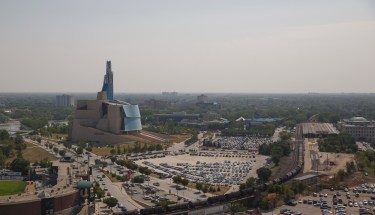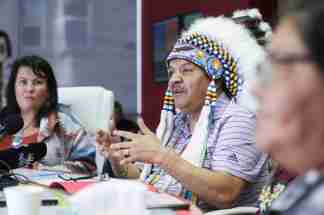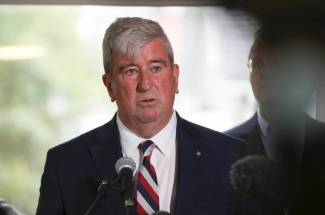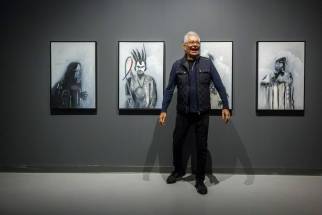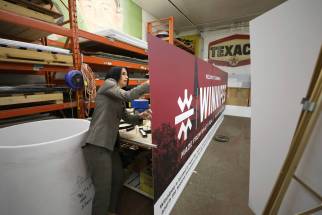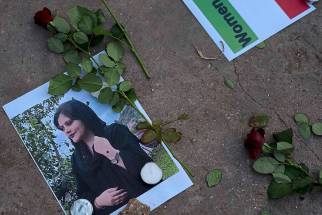Murray tanking his job interview Former mayor shows little respect for voters by refusing to answer questions about troubling allegations
Read this article for free:
or
Already have an account? Log in here »
To continue reading, please subscribe:
Monthly Digital Subscription
$0 for the first 4 weeks*
- Enjoy unlimited reading on winnipegfreepress.com
- Read the E-Edition, our digital replica newspaper
- Access News Break, our award-winning app
- Play interactive puzzles
*No charge for 4 weeks then price increases to the regular rate of $19.00 plus GST every four weeks. Offer available to new and qualified returning subscribers only. Cancel any time.
Monthly Digital Subscription
$4.75/week*
- Enjoy unlimited reading on winnipegfreepress.com
- Read the E-Edition, our digital replica newspaper
- Access News Break, our award-winning app
- Play interactive puzzles
*Billed as $19 plus GST every four weeks. Cancel any time.
To continue reading, please subscribe:
Add Free Press access to your Brandon Sun subscription for only an additional
$1 for the first 4 weeks*
*Your next subscription payment will increase by $1.00 and you will be charged $16.99 plus GST for four weeks. After four weeks, your payment will increase to $23.99 plus GST every four weeks.
Read unlimited articles for free today:
or
Already have an account? Log in here »
Hey there, time traveller!
This article was published 06/10/2022 (1160 days ago), so information in it may no longer be current.
Election campaigns are like job interviews: candidates are the applicants and members of the public are the prospective employers.
Those who want to hold public office and make important decisions on behalf of the people (and who usually collect generous paycheques for their efforts) are typically engaged in lengthy job interviews during election campaigns.
The public asks questions about their qualifications, their ideas and how they performed in various roles in the past. As prospective employers, the public expects answers. It’s the same for people seeking regular employment. They often face lengthy, sometimes gruelling, interviews and are asked about past performance, including how they handled difficult situations in their former jobs.
JOHN WOODS / WINNIPEG FREE PRESS FILES Election campaigns are like job interviews where the public asks questions about a candidates qualifications, ideas and past performance. Glen Murray thinks that scrutiny does not apply to him.
Mayoral candidate Glen Murray doesn’t think that scrutiny applies to him. A recent CBC News investigative report found the former Winnipeg mayor was dismissed from his previous job at the Pembina Institute in Calgary — a non-profit clean energy think tank — and is accused of multiple transgressions, including sexual innuendo in the workplace, physically harassing a former employee, breaching confidentiality and refusing to accept briefings. He was allegedly frequently late for meetings or didn’t show up at all. Last week, in a statement he made in response to that report, Murray denied the sexual harassment allegations. However, he acknowledged issues in his personal life affected his job performance and that his work style clouded his judgment.
Allegations of sexual harassment normally result in calls for further investigation, especially when they involve people in positions of power. Let’s hope that standard hasn’t changed for Murray just because he was once a popular mayor of Winnipeg.
Murray refused to take questions from reporters last week after reading his written statement. While he subsequently did make time for questions from the Free Press, it took six days for him to face the media again, this time following an outdoor campaign announcement on Broadway Wednesday morning. After the announcement, Murray was asked questions by multiple media outlets about last week’s statement and the allegations against him. He refused to answer.
A visibly distraught Murray, his hands shaking, said he already made a statement about his time at the Pembina Institute and had nothing further to say.
He then walked away. Several journalists followed him, as they often do when politicians refuse to answer questions, and continued to seek clarification about statements he made last week. How did issues in his personal life affect his job performance? In what way was his judgment as a manager affected? Why was he a bad fit for the Pembina Institute? What assurances do Winnipeggers have that this won’t happen again if he becomes mayor?
A visibly distraught Murray, his hands shaking, said he already made a statement about his time at the Pembina Institute and had nothing further to say.
Murray remained silent. He hurried east along Broadway with campaign staff in tow and ducked into the Hotel Fort Garry. The interview was over.
At a mayoral forum earlier that morning, Murray was asked about the allegations against him. He gave, largely, a non-answer. But he did add this: “I don’t bring my problems to work.” That was a direct contradiction to what he said last week.
“In my time at the Pembina Institute I was ambitious and working hard on goals I thought we all shared as a team,” Murray said last week at his campaign office. “It was also, however, a time of great change in my private life, and it is clear that I allowed that pressure to spill over into my work life.”
He also said: “The way I worked was not a good fit with the culture of the organization,” and added that he regrets “allowing my passion to deliver on my mandate to have clouded my managerial judgment. Even more, I apologize for any stress or tension I caused with my approach leading Pembina.”
“It was also, however, a time of great change in my private life, and it is clear that I allowed that pressure to spill over into my work life.”–Glen Murray
Clearly, Murray brings his problems to work, or at least he did. Would he continue to bring those problems to work if he became mayor again? What are those problems? Would they spill into council meetings? Would it affect interactions with staff and city stakeholders? Voters deserve to know.
These are important questions any prospective employer would ask. Everyone knows that, including the people who have thrown their unconditional support behind him. If Murray were to refuse to answer those questions in a regular job interview, he would be disqualified on the spot. It should be no different for someone seeking public office.
tom.brodbeck@freepress.mb.ca

Tom has been covering Manitoba politics since the early 1990s and joined the Winnipeg Free Press news team in 2019.
Our newsroom depends on a growing audience of readers to power our journalism. If you are not a paid reader, please consider becoming a subscriber.
Our newsroom depends on its audience of readers to power our journalism. Thank you for your support.









